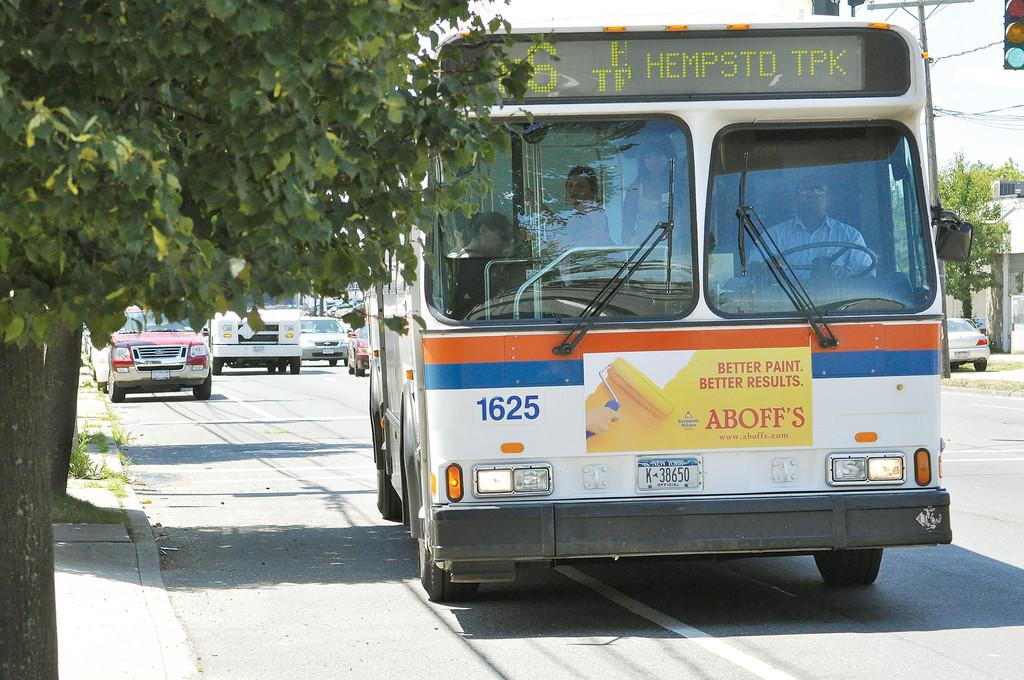County to privatize public bus service
In a move that would end the MTA’s “monopoly” over transportation in Nassau County, a private company will take over operation of the Long Island Bus System next year.
County Executive Edward Mangano said he will move forward with a public-private partnership to maintain bus service following a decision by the MTA board last week to terminate its contract, which expires on Dec. 31, to run the system.
“It’s a sad day in America when a government agency such as the MTA chooses to maintain its bloated bureaucracy over the services it is charged to provide its residents,” Mangano said in a statement on April 27. “My actions stop the MTA from further subsiding NYC’s transportation system with Nassau tax dollars. The MTA’s monopoly over transportation in Nassau County ends now.”
The MTA board unanimously voted to end the agency’s 38-year lease to run the county-owned bus system as a cost-saving measure. Facing an $800 million deficit last July, the MTA had announced that it wanted to stop subsidizing LI Bus altogether and have the county pick up the tab.
The MTA declined comment on the contract termination.
As it stands, the MTA contributes $26 million a year to the bus system’s $134 million contract. Nassau County contributes $9.1 million. The state contributes $44 million and fare revenues make up the difference. Mangano said the county could not afford to increase its subsidy to make up for the MTA’s share and instead decided to explore privatization. An independent committee is now reviewing bids from three private companies and is expected to make a recommendation to Mangano by May 15. The recommendation will then be presented to the Legislature for approval.
But privatization may not be the best option for the county, according to Comptroller George Maragos, who conducted a study of the Long Island Bus situation last year. The comptroller had said in November, when he released the findings of the study, that he did not consider any of the three private companies viable long-term solutions. While each of the large municipal bus operators responded to Mangano’s request for bids without subsidies, the comptroller found that there are no instances in which they have run a municipal system without local subsidies. Additionally, Maragos had said, the operators may require significant fare increases of us to 20 percent and the state may pull all subsidies without a county-matching subsidy.
Other opponents of privatization are concerned that the privatization plan could lead to cuts in services and job losses.
“The savings from privatization are fake,” said Patricia Bowden, president of the Transportation Workers Union Local 252. “Higher cost for taxpayers, fare hikes and service cuts are real.”
The phony savings, according to Bowden, are a result of Nassau County’s agreements, under provisions of the Federal Transit Act, to collective bargaining, job security and income protections for Long Island Bus workers. Because the agreements will be binding on any new private operator, the county’s claims of reduced labor costs due to privatization are not factual, Bowden said.
As for service cuts, Bowden said a private operator may choose to reduce routes and leave millions of riders stranded or force them onto already clogged roads. “The result would be slower traffic all over Long Island, increased pollution and higher rates of asthma and other respiratory diseases,” she said.
Calling the privatization plan “half-baked,” Bowden went on to say that under the current contract, Long Island Bus provides safe and efficient service using qualified, licensed and certified employees. She questioned whether that would continue under a new plan. “Will a private operator that is looking to make a profit off operations that have always been subsidized offer the same level of quality service?” she asked.






